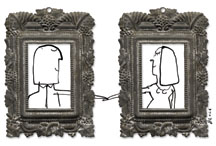
|
April 2, 2008: On the Campus
(Illustration: Serge Bloch; photos: Hyunseok Shim ’08) |
Support for chastity, and thesis writers
 By
Isia Jasiewicz ’10
By
Isia Jasiewicz ’10
Nestled neatly on the 200-level of the Frist Campus Center is a series of rooms housing support groups for students: the Women’s Center, the Davis Inter-national Center, the LGBT Center. And if one set of students gets their way, space may be needed for another support group: the Chastity Center.
The idea of a “chastity center,” or a “center for morally traditional students,” was proposed in a Feb. 18 opinion column in The Daily Princetonian by Brandon McGinley ’10, public relations chairman of the Anscombe Society, a student organization promoting conservative views on sexuality. The nonsectarian center would provide University-sponsored support to
morally traditional students “who find it difficult to live out their commitments” in light of their “political marginalization,” McGinley wrote.
The proposal “makes such obvious sense,” said politics professor Robert George, a prominent conservative. “Students whose moral views run contrary to the hookup culture are looking for support and are having trouble finding it.”
Some students questioned the need for a new center, saying that the Women’s Center, LGBT Center, and similar groups were founded to provide support for students with inherent traits that have faced historical marginalization. “People are confused about why chaste students feel the need for such a center,” said Sara Viola ’08.
Students also expressed concern that the chastity center could be mistakenly seen as a counterpart to the LGBT Center. “It seems as if [promoters of the chastity center] are characterizing the LGBT Center as promoting a sexual lifestyle,” Viola said.
“We’re not claiming that same-sex orientation itself is an ideology,” said Sherif Girgis ’08, former president of the Anscombe Society and a 2008 Rhodes scholar. “But the University has already recognized the importance of institutionally supporting students on issues of sexuality, and chaste students could benefit from such support.”
Janet Dickerson, vice president for campus life, said the University has no serious plans at this time to create a chastity center. “While I will certainly give the idea consideration, I’m not inclined to say that we should have a center for morally conservative students because I hope that the University is a center for all students.”
 By
Bianca Bosker ’08
By
Bianca Bosker ’08
Bud Grote’s senior thesis in the economics department is due in less than a month, and time is running short. “I certainly won’t be washing my laundry over the next couple of weeks,” Grote admitted. “Any-thing that’s not absolutely necessary to do pre-thesis is not going to get done.”
But thanks to a new Thesis Buddies program for seniors in Whitman College, one of Princeton’s new four-year residential colleges, students like Grote just might get a hand keeping their clothes clean. As part of the initiative, participating seniors are assigned two underclassmen volunteers who will perform small tasks for their senior “buddies” in the three weeks preceding the thesis deadline, such as picking up a midnight snack, returning library books, or starting a load of laundry.
In an e-mail to Whitman College students, Director of Studies Cole Crittenden said that the time commitment shouldn’t exceed 15 minutes per week and that no academic support, such as attending a lecture or doing a senior’s homework, would be permitted.
While an initial report in The Daily Princetonian prompted comparisons of the program to a form of freshman hazing, Crittenden said the idea was to create “a service project for the college: Students perform a small-scale project for their peers who happen to be in a pretty stressful time.”
The Whitman College administration hopes the Thesis Buddies program will not only aid frazzled seniors, but also give underclassmen a look at the thesis-writing process. “If underclassmen see a student during a stressful period and realize that there are things they could do earlier on, it might be a warning to structure their time better,” Crittenden said.
Grote can’t wait to be assigned his Thesis Buddy. “Every senior I’ve talked to is looking forward to it,” he said.
But Josh Franklin, a freshman in Whitman, was less enthused. Asking for a favor seems like more effort than doing the job himself, he said, adding that students are eager to help each other, even without an official program.
“If this particular program is not one that students respond to,”
Crittenden said, “we’re going to be thinking of other ways
to support our seniors.” ![]()

To read our exclusively online On the Campus column, click here.
